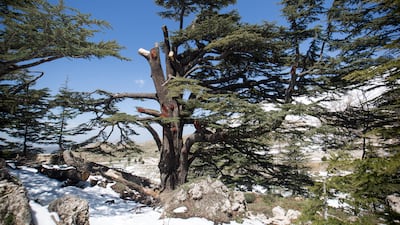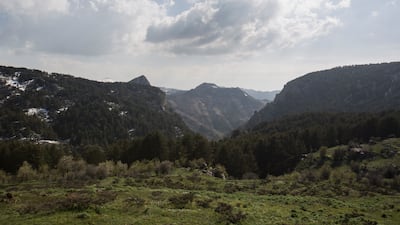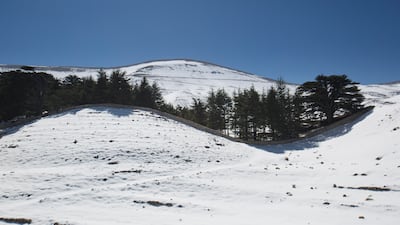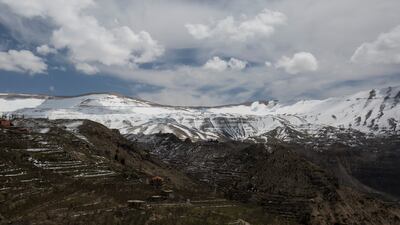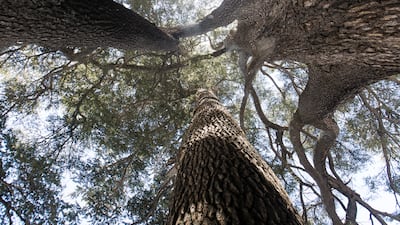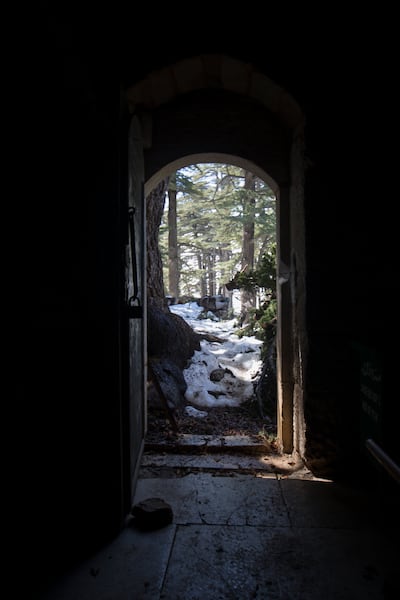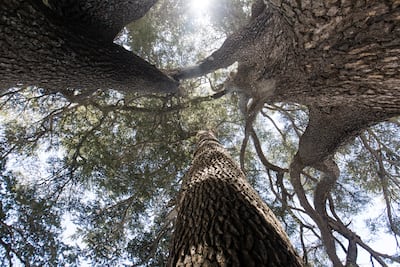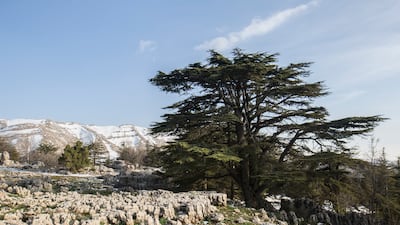Draped with snow, the ancient cedars on the mountain slopes of northern Lebanon spread their evergreen branches like arms welcoming visitors. On Mount Makmel, the country’s oldest cedar grove towers over Wadi Qadisha, the “Holy Valley”, where monasteries carved into cliffs for centuries were a place of refuge and meditation.
Known locally as Arz al-Rab or “Cedars of God”, the forest has been under the protection of the Maronite Church, which built a small chapel in the centre of the grove, where a mass is celebrated each year to honour the trees. Some of the cedars there are more than 30 metres tall and 2,000 years old, their roots anchored deep in the rocky soil.
“The forest is considered a sacred place,” says Cherbel Tawk, a member of the nonprofit Friends of the Cedar Forest Committee. In 1998, the cedar grove was added to the list of Unesco World Heritage together with the Qadisha Valley.
“The cedars are mentioned in the bible at least 75 times for their majesty and beauty. It is said the temple of Solomon was built with cedar wood,” Tawk says. In the Old Testament, cedars are referred to as “the first of trees” and the “glory of Lebanon". In the 16th century, there were so many pilgrims visiting the Cedars of God that the Maronite Church issued an edict threatening to excommunicate visitors who damaged them.
For centuries, the ancient giants have been visited by travellers, pilgrims and poets. Inspired by the majestic trees, artists composed songs, paintings and poems. Some, like the English poet Lord Byron and the French politician and poet Alphonse de Lamartine, decided to leave their mark and carved their initials into the trunks.
"[Cedars] know the history of the Earth better than history itself,” wrote Lamartine, who described Lebanon’s ancient trees as “the most famous natural monument” in the world. The poet Gibran Kahlil Gibran, who was from nearby Bcharri, mentioned the trees in his poems and asked to be buried under a cedar.
Celebrated by religion, poetry and history, Lebanon’s cedar is a source of national pride. The tree is the centrepiece of the Lebanese flag, and is featured on the currency, the Lebanese airlines and the national anthem. It’s so cherished that some Lebanese even swear upon the cedars.
“The cedar became a unifying symbol for Lebanese all over the world,” Tawk says. According to him, the tree used as a model for the flag can still be visited in the Cedars of God. It has been damaged by a snowstorm and a lightning strike, but Tawk says his organisation is taking care of the elderly cedars. “Old trees need special care. We are treating their wounds and protecting them from storms,” he adds.
A history of deforestation
Accounts of the cedar go back to one of the first stories written, the Sumerian Epic of Gilgamesh, which dates back at least 4,000 years. In a quest for fame and glory, Gilgamesh travels to a forest that stretches for thousands of miles where “the cedars uplift their abundance” and sweet-smelling flowers grow under their branches. But instead of enjoying the beauty and the shade, Gilgamesh kills the guardian of the forest, cuts down the cedars and takes the wood to his city in ancient Mesopotamia.
For Faisal Abu-Izzeddin, a conservationist who wrote a book about cedars, the history of Lebanon’s most famous tree is one of environmental devastation. Over millennia, the forests that once blanketed Mount Lebanon were cut down by different civilisations.
Phoenicians used the wood to build their merchant ships. Ancient Egyptians used the resin in the mummification process. Greeks, Romans, Byzantines, crusaders and colonisers all exploited Lebanon’s cedars. Centuries of reckless deforestation have left only scattered remnants of what were once extensive forests.
“There is this idea that the cedar is going to bring us peace, glory and closer to gGod. And yet we cut it down,” Abu-Izzeddin says. “What is left is what couldn’t be cut, in the most remote places.”
The tree has been added to the International Union for Conservation of Nature's list of threatened species, and today only 17 square kilometres of cedars remain in Lebanon. Additional populations of Lebanese cedars can be found on rocky slopes in Turkey and Syria.
The urgency of protecting the surviving forests is felt across Lebanon. The Cedars of God have been fenced off since 1876, and in recent years volunteers have planted more than 100,000 seedlings around the forest.
The Shouf Biosphere Reserve, established in 1996, the country’s largest protected area, is home to a quarter of the remaining stands of cedar. “The cedar tree is part of our history, it’s an iconic tree,” says Nizar Hani, the reserve director. “We are looking at the cedar’s ecosystem as a unit, and trying to protect it by ensuring connectivity with the full participation of local communities,” he says.
While Hani says there is now more awareness about conservation and the cedar is protected by law, new threats have emerged in the past few decades.
“Last year the forest fires were very close to the cedar forest, it was the first time they reached such a high altitude,” Hani says. To grow, cedars need humidity and enough rain and snow, so the tree is particularly vulnerable to climate change.
Rising temperatures and worsening drought are driving wildfires and spawning infestations of sawflies, which can kill cedars. Conservationists are hoping that planting cedars with other species can make ecosystems more diverse and more resilient to the pressures of a warming and drying climate.
“The cedar cannot live alone, it needs other trees, plants, birds. It needs an ecosystem,” says Abu-Izzeddin, who was one of the founding members of the Shouf Reserve. “Without an ecosystem cedars cannot live. And without ecosystems we cannot live.”
A symbol of strength and endurance
The cedar’s ability to outlive empires and to survive under difficult conditions is precisely what makes it such a compelling symbol of Lebanon.
Growing on high and rocky mountains, cedars have endured harsh winters, strong winds and drought. Their roots can penetrate rock and find springs in even the roughest terrain. For many Lebanese, this strong tree came to symbolise their own ability to survive occupation, war and devastation.
“The cedar is a symbol of belonging, of our roots,” says Alice Mogabgab, who owns an art gallery that was damaged three times by blasts in the past three decades. “We are struggling with corruption, bankruptcy, destruction. More than ever we need to strengthen our roots and attachment to the land,” she says.
On August 4, 2020, her gallery was shattered by the enormous explosion at the port in Beirut that wreaked destruction across the city. While sweeping the broken glass and picking up shards, Mogabgab thought about closing the gallery. She changed her mind when she was moving paintings of trees, and decided to make the first exhibition after the explosion about Lebanon’s cedars.
“I wanted to show the most beautiful thing we have in reaction to the destruction,” she says, adding that she wanted to spread a message of hope when everything and everyone around her seemed devastated.
“It’s time to be inspired by the trees. To plant them, and to protect them,” she says in a soft, cautiously hopeful voice. “To show a different way of living in this country.”
Benefits of first-time home buyers' scheme
- Priority access to new homes from participating developers
- Discounts on sales price of off-plan units
- Flexible payment plans from developers
- Mortgages with better interest rates, faster approval times and reduced fees
- DLD registration fee can be paid through banks or credit cards at zero interest rates
The%20specs
%3Cp%3E%3Cstrong%3EEngine%3A%20%3C%2Fstrong%3E2.0-litre%204-cyl%20turbo%3Cbr%3E%3Cstrong%3EPower%3A%20%3C%2Fstrong%3E190hp%20at%205%2C600rpm%3Cbr%3E%3Cstrong%3ETorque%3A%20%3C%2Fstrong%3E320Nm%20at%201%2C500-4%2C000rpm%3Cbr%3E%3Cstrong%3ETransmission%3A%20%3C%2Fstrong%3E7-speed%20dual-clutch%20auto%3Cbr%3E%3Cstrong%3EFuel%20consumption%3A%20%3C%2Fstrong%3E10.9L%2F100km%3Cbr%3E%3Cstrong%3EPrice%3A%20%3C%2Fstrong%3EFrom%20Dh119%2C900%3Cbr%3E%3Cstrong%3EOn%20sale%3A%20%3C%2Fstrong%3ENow%3C%2Fp%3E%0A
RESULT
Arsenal 1 Chelsea 2
Arsenal: Aubameyang (13')
Chelsea: Jorginho (83'), Abraham (87')
500 People from Gaza enter France
115 Special programme for artists
25 Evacuation of injured and sick
Dhadak 2
Director: Shazia Iqbal
Starring: Siddhant Chaturvedi, Triptii Dimri
Rating: 1/5
Our family matters legal consultant
Name: Dr Hassan Mohsen Elhais
Position: legal consultant with Al Rowaad Advocates and Legal Consultants.
T20 World Cup Qualifier
Final: Netherlands beat PNG by seven wickets
Qualified teams
1. Netherlands
2. PNG
3. Ireland
4. Namibia
5. Scotland
6. Oman
T20 World Cup 2020, Australia
Group A: Sri Lanka, PNG, Ireland, Oman
Group B: Bangladesh, Netherlands, Namibia, Scotland
more from Janine di Giovanni
PROFILE BOX
Company name: Overwrite.ai
Founder: Ayman Alashkar
Started: Established in 2020
Based: Dubai International Financial Centre, Dubai
Sector: PropTech
Initial investment: Self-funded by founder
Funding stage: Seed funding, in talks with angel investors
More from Rashmee Roshan Lall
The specs
Engine: 2.0-litre 4cyl turbo
Power: 261hp at 5,500rpm
Torque: 405Nm at 1,750-3,500rpm
Transmission: 9-speed auto
Fuel consumption: 6.9L/100km
On sale: Now
Price: From Dh117,059
All the Money in the World
Director: Ridley Scott
Starring: Charlie Plummer, Mark Wahlberg, Michelle Williams, Christopher Plummer
Four stars
How to protect yourself when air quality drops
Install an air filter in your home.
Close your windows and turn on the AC.
Shower or bath after being outside.
Wear a face mask.
Stay indoors when conditions are particularly poor.
If driving, turn your engine off when stationary.
What the law says
Micro-retirement is not a recognised concept or employment status under Federal Decree Law No. 33 of 2021 on the Regulation of Labour Relations (as amended) (UAE Labour Law). As such, it reflects a voluntary work-life balance practice, rather than a recognised legal employment category, according to Dilini Loku, senior associate for law firm Gateley Middle East.
“Some companies may offer formal sabbatical policies or career break programmes; however, beyond such arrangements, there is no automatic right or statutory entitlement to extended breaks,” she explains.
“Any leave taken beyond statutory entitlements, such as annual leave, is typically regarded as unpaid leave in accordance with Article 33 of the UAE Labour Law. While employees may legally take unpaid leave, such requests are subject to the employer’s discretion and require approval.”
If an employee resigns to pursue micro-retirement, the employment contract is terminated, and the employer is under no legal obligation to rehire the employee in the future unless specific contractual agreements are in place (such as return-to-work arrangements), which are generally uncommon, Ms Loku adds.
Heather, the Totality
Matthew Weiner,
Canongate
Pieces of Her
Stars: Toni Collette, Bella Heathcote, David Wenham, Omari Hardwick
Director: Minkie Spiro
Rating:2/5
WHY%20AAYAN%20IS%20'PERFECT%20EXAMPLE'
%3Cp%3EDavid%20White%20might%20be%20new%20to%20the%20country%2C%20but%20he%20has%20clearly%20already%20built%20up%20an%20affinity%20with%20the%20place.%3Cbr%3E%3Cbr%3EAfter%20the%20UAE%20shocked%20Pakistan%20in%20the%20semi-final%20of%20the%20Under%2019%20Asia%20Cup%20last%20month%2C%20White%20was%20hugged%20on%20the%20field%20by%20Aayan%20Khan%2C%20the%20team%E2%80%99s%20captain.%3Cbr%3E%3Cbr%3EWhite%20suggests%20that%20was%20more%20a%20sign%20of%20Aayan%E2%80%99s%20amiability%20than%20anything%20else.%20But%20he%20believes%20the%20young%20all-rounder%2C%20who%20was%20part%20of%20the%20winning%20Gulf%20Giants%20team%20last%20year%2C%20is%20just%20the%20sort%20of%20player%20the%20country%20should%20be%20seeking%20to%20produce%20via%20the%20ILT20.%3Cbr%3E%3Cbr%3E%E2%80%9CHe%20is%20a%20delightful%20young%20man%2C%E2%80%9D%20White%20said.%20%E2%80%9CHe%20played%20in%20the%20competition%20last%20year%20at%2017%2C%20and%20look%20at%20his%20development%20from%20there%20till%20now%2C%20and%20where%20he%20is%20representing%20the%20UAE.%3Cbr%3E%3Cbr%3E%E2%80%9CHe%20was%20influential%20in%20the%20U19%20team%20which%20beat%20Pakistan.%20He%20is%20the%20perfect%20example%20of%20what%20we%20are%20all%20trying%20to%20achieve%20here.%3Cbr%3E%3Cbr%3E%E2%80%9CIt%20is%20about%20the%20development%20of%20players%20who%20are%20going%20to%20represent%20the%20UAE%20and%20go%20on%20to%20help%20make%20UAE%20a%20force%20in%20world%20cricket.%E2%80%9D%C2%A0%3C%2Fp%3E%0A
UAE currency: the story behind the money in your pockets
F1 The Movie
Starring: Brad Pitt, Damson Idris, Kerry Condon, Javier Bardem
Director: Joseph Kosinski
Rating: 4/5
'Downton Abbey: A New Era'
Director: Simon Curtis
Cast: Hugh Bonneville, Elizabeth McGovern, Maggie Smith, Michelle Dockery, Laura Carmichael, Jim Carter and Phyllis Logan
Rating: 4/5
Killing of Qassem Suleimani
The%20Witcher%20-%20season%20three
%3Cp%3E%3Cstrong%3EDirector%3A%20%3C%2Fstrong%3EVarious%0D%3Cbr%3E%3Cstrong%3E%0D%3Cbr%3EStars%3A%20%3C%2Fstrong%3EHenry%20Cavill%2C%20Freya%20Allan%2C%20Anya%20Chalotra%3Cstrong%3E%0D%3Cbr%3E%0D%3Cbr%3ERating%3A%3C%2Fstrong%3E%203%2F5%3C%2Fp%3E%0A
Bridgerton%20season%20three%20-%20part%20one
%3Cp%3E%3Cstrong%3EDirectors%3A%20%3C%2Fstrong%3EVarious%3C%2Fp%3E%0A%3Cp%3E%3Cstrong%3EStarring%3A%3C%2Fstrong%3E%20Nicola%20Coughlan%2C%20Luke%20Newton%2C%20Jonathan%20Bailey%3C%2Fp%3E%0A%3Cp%3E%3Cstrong%3ERating%3A%20%3C%2Fstrong%3E3%2F5%3C%2Fp%3E%0A
match info
Manchester United 3 (Martial 7', 44', 74')
Sheffield United 0
Panipat
Director Ashutosh Gowariker
Produced Ashutosh Gowariker, Rohit Shelatkar, Reliance Entertainment
Cast Arjun Kapoor, Sanjay Dutt, Kriti Sanon, Mohnish Behl, Padmini Kolhapure, Zeenat Aman
Rating 3 /5 stars
The National's picks
4.35pm: Tilal Al Khalediah
5.10pm: Continous
5.45pm: Raging Torrent
6.20pm: West Acre
7pm: Flood Zone
7.40pm: Straight No Chaser
8.15pm: Romantic Warrior
8.50pm: Calandogan
9.30pm: Forever Young
CREW
%3Cp%3E%3Cstrong%3EDirector%3A%20%3C%2Fstrong%3ERajesh%20A%20Krishnan%3C%2Fp%3E%0A%3Cp%3E%3Cstrong%3EStarring%3A%20%3C%2Fstrong%3ETabu%2C%20Kareena%20Kapoor%20Khan%2C%20Kriti%20Sanon%26nbsp%3B%3C%2Fp%3E%0A%3Cp%3E%3Cstrong%3ERating%3A%3C%2Fstrong%3E%203.5%2F5%3C%2Fp%3E%0A
The%20specs
%3Cp%3E%3Cstrong%3EPowertrain%3A%20%3C%2Fstrong%3ESingle%20electric%20motor%0D%3Cbr%3E%3Cstrong%3EPower%3A%20%3C%2Fstrong%3E201hp%0D%3Cbr%3E%3Cstrong%3ETorque%3A%20%3C%2Fstrong%3E310Nm%0D%3Cbr%3E%3Cstrong%3ETransmission%3A%20%3C%2Fstrong%3ESingle-speed%20auto%0D%3Cbr%3E%3Cstrong%3EBattery%3A%20%3C%2Fstrong%3E53kWh%20lithium-ion%20battery%20pack%20(GS%20base%20model)%3B%2070kWh%20battery%20pack%20(GF)%0D%3Cbr%3E%3Cstrong%3ETouring%20range%3A%20%3C%2Fstrong%3E350km%20(GS)%3B%20480km%20(GF)%0D%3Cbr%3E%3Cstrong%3EPrice%3A%20%3C%2Fstrong%3EFrom%20Dh129%2C900%20(GS)%3B%20Dh149%2C000%20(GF)%0D%3Cbr%3E%3Cstrong%3EOn%20sale%3A%3C%2Fstrong%3E%20Now%3C%2Fp%3E%0A
Killing of Qassem Suleimani
Our legal consultant
Name: Hassan Mohsen Elhais
Position: legal consultant with Al Rowaad Advocates and Legal Consultants.
RESULTS
2.15pm Maiden (PA) Dh40,000 (Dirt) 1,200m
Winner Shawall, Abdul Aziz Al Balushi (jockey), Majed Al Jahouri (trainer)
2.45pm Handicap (PA) Dh40,000 (D) 1,200m
Winner Anna Bella Aa, Fabrice Veron, Abdelkhir Adam
3.15pm Handicap (PA) Dh40,000 (D) 1,200m
Winner AF Thayer, Tadhg O’Shea, Ernst Oertel
3.45pm Handicap (PA) Dh40,000 (D) 1,700m
Winner Taajer, Fabrice Veron, Eric Lemartinel
4.15pm The Ruler of Sharjah Cup – Prestige (PA) Dh250,000 (D) 1,700m
Winner Jawaal, Jim Crowley, Majed Al Jahouri
4.45pm Handicap (TB) Dh40,000 (D) 2,000m
Winner Maqaadeer, Jim Crowley, Doug Watson
Meydan race card
6.30pm: Maiden; Dh165,000; (Dirt) 1,200m
7.05pm: Handicap; Dh170,000; (D) 1,200m
7.40pm: Maiden; Dh165,000; (D) 1,900m
8.15pm: Handicap; Dh185,000; (D) 2,000m
8.50pm: Handicap; Dh185,000; (D) 1,600m
9.25pm: Handicap; Dh165,000; (D) 2,000m
Test squad: Azhar Ali (captain), Abid Ali, Asad Shafiq, Babar Azam, Haris Sohail, Imam-ul-Haq, Imran Khan, Iftikhar Ahmed, Kashif Bhatti, Mohammad Abbas, Mohammad Rizwan(wicketkeeper), Musa Khan, Naseem Shah, Shaheen Afridi, Shan Masood, Yasir Shah
Twenty20 squad: Babar Azam (captain), Asif Ali, Fakhar Zaman, Haris Sohail, Iftikhar Ahmed, Imad Wasim, Imam-ul-Haq, Khushdil Shah, Mohammad Amir, Mohammad Hasnain, Mohammad Irfan, Mohammad Rizwan (wicketkeeper), Musa Khan, Shadab Khan, Usman Qadir, Wahab Riaz
Killing of Qassem Suleimani
